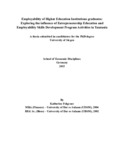Citation link:
https://nbn-resolving.org/urn:nbn:de:hbz:467-9858Files in This Item:
| File | Description | Size | Format | |
|---|---|---|---|---|
| Dissertation_Katherine_Fulgence.pdf | 2.98 MB | Adobe PDF |  View/Open |
| Dokument Type: | Doctoral Thesis | metadata.dc.title: | Employability of higher education institutions graduates : exploring the influence of entrepreneurship education and employability skills development program activities in Tanzania | Authors: | Fulgence, Katherine | Institute: | Fakultät III - Wirtschaftswissenschaften, Wirtschaftsinformatik und Wirtschaftsrecht | Free keywords: | Skills development, Graduates, Systems Dynamics, Employability, Entrepreneurship Education | Dewey Decimal Classification: | 650 Management | GHBS-Clases: | PZZ QAA |
Issue Date: | 2015 | Publish Date: | 2016 | Abstract: | The concept of employability has over time become a topic of interest among stakeholders of Higher Education Institutions (HEIs) including graduates. This has long been established by labour market studies suggesting skills gap between the labour requirements and the outputs from the education system. Although specific Employability Skills Development Programme (ESDP) activities have been identified to address employability within HEIs, individual background given its influence on competence level and mass enrolment are posing an increasing challenge in the process. In view of the above, this thesis explores the topic of employability of HEIs graduates. Specifically, it examines the influence of entrepreneurship education and ESDP activities in enhancing employability and graduate competencies. To provide for the theoretical background the study used human capital, systems and trait theories. Using triangulation approach, data were collected from 22 employers, 54 management members in schools of education at HEIs level and 554 graduates (378 from all the study fields and specifically 176 teachers who studied entrepreneurship education). The categorization of graduates also reflected their employment status comprising of employed, self employed and the unemployed. Findings indicate that employability can be enhanced through individual’s engagement in ESDP activities, which subsequently foster one’s employability skills. Taking a course in entrepreneurship has also been shown to enhance both employability and the related skills. Parent’s level of education and occupation do not influence one’s employability. The beneficial impact of ideal employability therefore depends on the interplay between an individual’s own initiatives in enhancing employability skills, the study institution and field of study. Additionally, while some employers recruit from specific disciplines, others recruit from diverse fields of study when graduates demonstrate higher level of employability and the related skills. The study therefore developed a model that can facilitate the development of employability skills among graduates. Simulation results indicate that it takes 75 months (6 years and 3 months) for an individual to acquire the required level of employability skills. And to maintain the same, a minimum of six ESDP activities is mandatory, not only during individuals’ time at HEIs but also during one’s career and throughout the life time. The study implications both practical and theoretical are further discussed. The dissertation also offered some areas for further research. |
URN: | urn:nbn:de:hbz:467-9858 | URI: | https://dspace.ub.uni-siegen.de/handle/ubsi/985 | License: | https://dspace.ub.uni-siegen.de/static/license.txt |
| Appears in Collections: | Hochschulschriften |
This item is protected by original copyright |
Page view(s)
1,975
checked on Dec 25, 2024
Download(s)
1,363
checked on Dec 25, 2024
Google ScholarTM
Check
Items in DSpace are protected by copyright, with all rights reserved, unless otherwise indicated.

